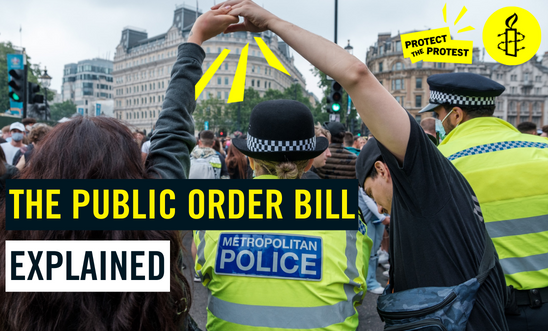
The Public Order Bill: Explained

The UK Government's Public Order bill has passed. Find out what this means below:
Today (26 April 2023) the final stages of the Public Order Bill finally passed the House of Lords. The bill will introduce yet more draconian powers to restrict people’s fundamental rights to peaceful protest. We know from history that without protest, there is no social progress.
What's the context of these new laws?
These new laws follow hot on the heels of last years' protest restrictions contained in the Police, Crime, Sentencing and Courts Act 2022. This Act introduced new vague and undefined police and government powers to clamp down on any protests – including by one person.
Even without the Public Order bill, protests can now be shut down if they're considered too noisy or likely to be a nuisance.
Remember: all these new anti-protest laws will only apply to England and Wales because policing is a devolved issue, meaning Scotland and Northern Ireland are not affected.
What do these new laws mean?
In short, this Public Order legislation will see yet more restrictions people’s rights by:
- Setting a very low threshold to define disruptive protesting
- Giving police significant new powers to prevent protests occurring outside of major transport networks, oil and gas and energy supplies
- Making “locking on” a new criminal offence
- Extending the use of stop and search powers – including suspicion-less stop and search – to protests
- Introducing of new protest banning orders that would prevent individuals from attending protests at all.
Why is the Public Order bill so problematic?
Are the measures in the Public Order Bill proportionate?
Said simply: no. Expansion of stop and search powers related to protests, protest banning orders and criminalising locking on are deeply authoritarian.
Existing international human rights standards require governments to not introduce any measures that place undue restrictions on people’s freedom of expression and assembly.
Under international standards, it is accepted that protest by its very nature can be disruptive, and governments should not introduce laws that create a “chilling effect” on people ability to exercise those rights.
Are the measures in the Public Order Bill necessary?
You guessed it again: no. Amnesty has long held the view that police already have sufficient powers to manage protest safely and to prevent violence or other serious criminal activity.
These measures are neither proportionate nor necessary and place the UK government in breach of its international obligations.
#PeoplePower has always been celebrated, tolerated and even facilitated in Britain and has helped forge the society we live in today
Today, those in power don't want to be held to account. They want to muzzle discontent and stop everyone’s ability to hold the powerful to account
— Amnesty UK (@AmnestyUK) April 26, 2023
Will these new powers make racism and overpolicing of marginalised groups worse?
Stop and search is counterproductive and it is widely misused against Black people.
Institutional racism already exists within policing and the wider criminal justice system. Stop and search powers are widely misused against Black people in particular, being 6 or 7 times more likely to be stopped than white people.
Such powers have also been proven to be largely counterproductive. They have no or at best marginal effect in preventing crime, while undermining relationships between police and communities.
Measures in the Public Order bill, such as the significant increase in stop and search powers, are likely to increase racial discrimination by actively discouraging people from overpoliced communities from exercising their fundamental rights to peaceful protest.
So, what now?
We will continue to campaign to protect the right to peaceful protest, in the UK and around the world. Will you join us?
Anti-protest policing by the Metropolitan Police during the Coronation was the writing on the wall read on.
Together, we will:
- Work to repeal both this Public Order legislation and the anti-protest measures contained in the Police, Crime, Sentencing and Courts Act 2022
- Monitor how the Police are using these news powers and urge them to refrain from excessive over policing of protests, reminding them of our international legal obligations to facilitate everyone rights to protest peacefully
- Looking to the courts to help set important safeguards and to prevent the misuse of these powers and to uphold everyone’s fundamental rights to protest peacefully.
Our blogs are written by Amnesty International staff, volunteers and other interested individuals, to encourage debate around human rights issues. They do not necessarily represent the views of Amnesty International.
0 comments